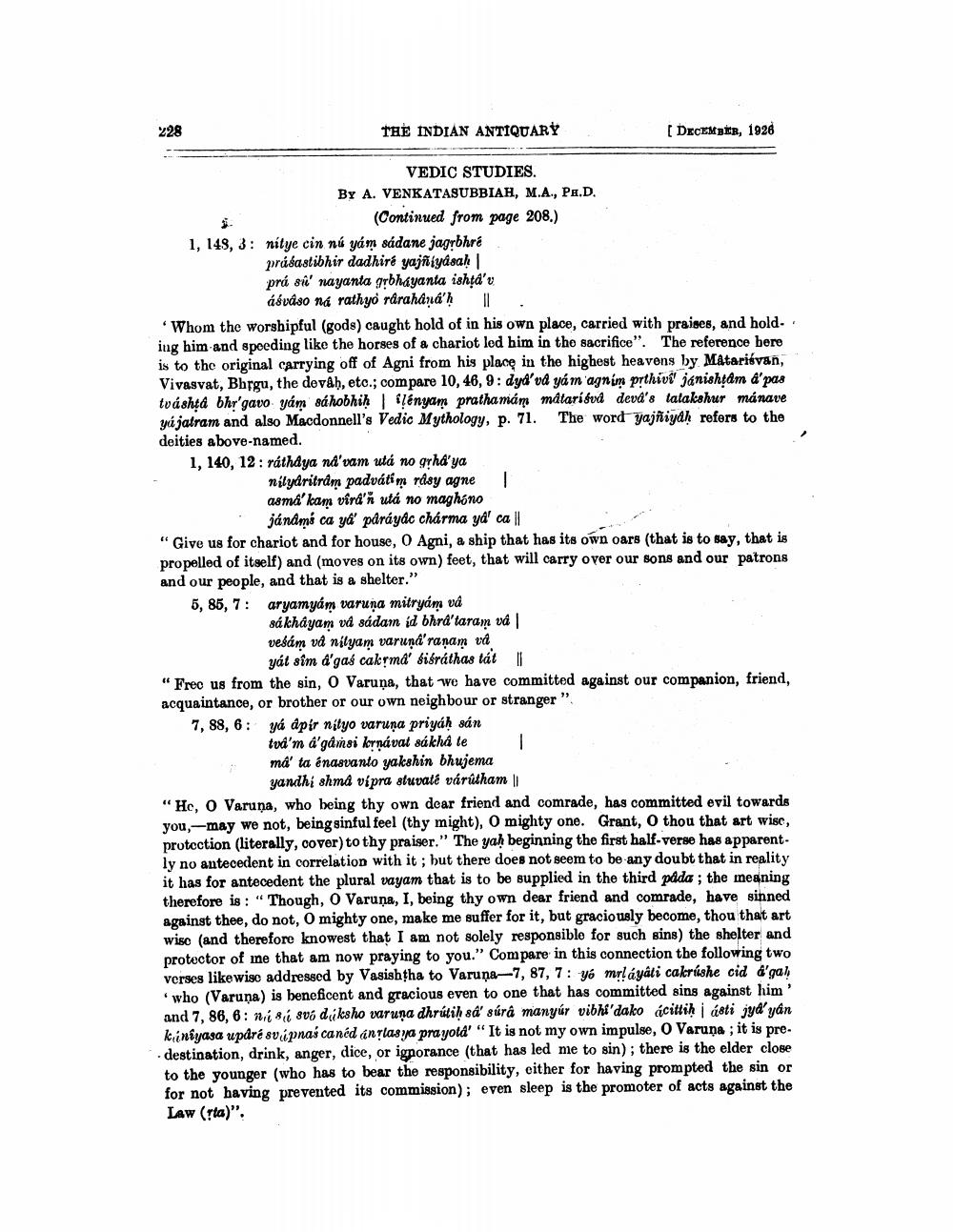________________
228
THE INDIAN ANTIQUARY
VEDIC STUDIES.
By A. VENKATASUBBIAH, M.A., PH.D. (Continued from page 208.)
j
1, 148, 3: nitye cin nú yám sádane jagrbhré prásastibhir dadhiré yajñiyâsaḥ | prá su nayanta grbhayanta ishta'v ásváso na rathyo rârahana'ḥ ||
'Whom the worshipful (gods) caught hold of in his own place, carried with praises, and holding him and speeding like the horses of a chariot led him in the sacrifice". The reference bere is to the original carrying off of Agni from his place in the highest heavens by Matariśvan, Vivasvat, Bhrgu, the devâḥ, etc.; compare 10, 46, 9: dya'va yám agním prthivi janishtam &'pas tváshta bhr'gavo yám sáhobhiḥ | lényam prathamám mátaríóvá devd's tatakshur mánave yájatram and also Macdonnell's Vedic Mythology, p. 71. The word yajñiyah refers to the deities above-named.
1, 140, 12: ráthâya na'vam utá no gṛha'ya
I
nilyaritram padvátim râsy agne asma' kam vira'n utá no maghono jánáms ca ya' páráyác chárma ya' ca ||
[ DECEMBER, 1926
Give us for chariot and for house, O Agni, a ship that has its own oars (that is to say, that is propelled of itself) and (moves on its own) feet, that will carry over our sons and our patrons and our people, and that is a shelter."
5, 85, 7: aryamyám varuna mitryám vâ
sákhayam vá sádam id bhrá'taram vá | veśám va nilyam varund'ranam vá yát sim d'gas cakṛma' siéráthas tát ||
"Free us from the sin, O Varuna, that we have committed against our companion, friend, acquaintance, or brother or our own neighbour or stranger "
1
7, 88, 6: yá âpir nityo varuna priyáḥ sán tvá'm á'gâmsi krnávat sákhâ te má' ta énasvanto yakshin bhujema yandhi shmå vipra stuvaté várûtham ||
"He, O Varuna, who being thy own dear friend and comrade, has committed evil towards you, may we not, being sinful feel (thy might), O mighty one. Grant, O thou that art wise, protection (literally, cover) to thy praiser." The yaḥ beginning the first half-verse has apparently no antecedent in correlation with it; but there does not seem to be any doubt that in reality it has for antecedent the plural vayam that is to be supplied in the third pada; the meaning therefore is: "Though, O Varuna, I, being thy own dear friend and comrade, have sinned against thee, do not, O mighty one, make me suffer for it, but graciously become, thou that art wise (and therefore knowest that I am not solely responsible for such sins) the shelter and protector of me that am now praying to you." Compare in this connection the following two verses likewise addressed by Vasishtha to Varuna-7, 87, 7: yó mrláyâti cakrúshe cid a'gal who (Varuna) is beneficent and gracious even to one that has committed sins against him' and 7, 86, 6: ni sú svo dúksho varuna dhrútiḥ sa' súrâ manyúr vibhi'dako ácittiḥ ásti jyd'yan kiniyasa upâré svúpnas caned anṛlasya prayota' "It is not my own impulse, O Varuna; it is predestination, drink, anger, dice, or ignorance (that has led me to sin); there is the elder close to the younger (who has to bear the responsibility, either for having prompted the sin or for not having prevented its commission); even sleep is the promoter of acts against the Law (rta)".
"




